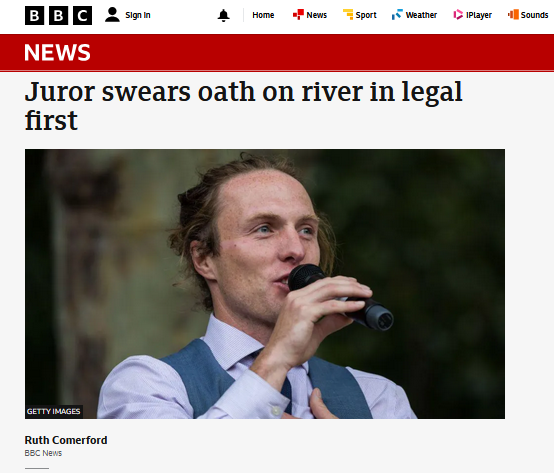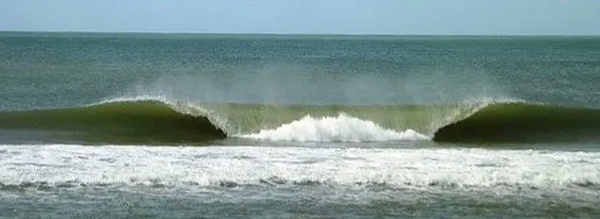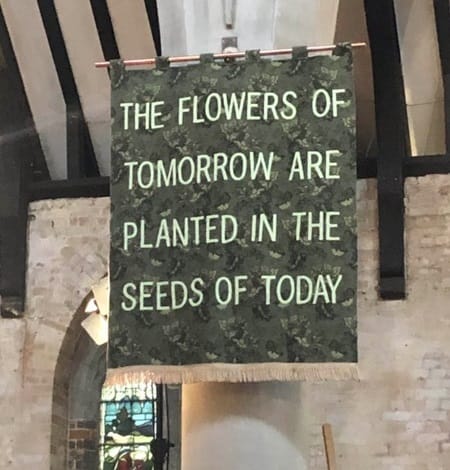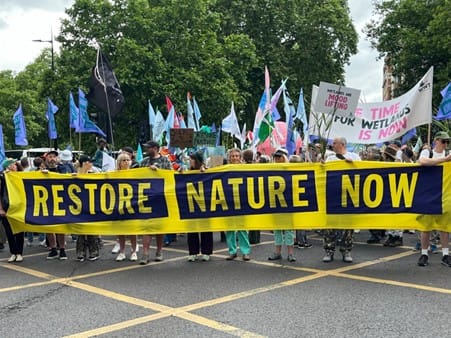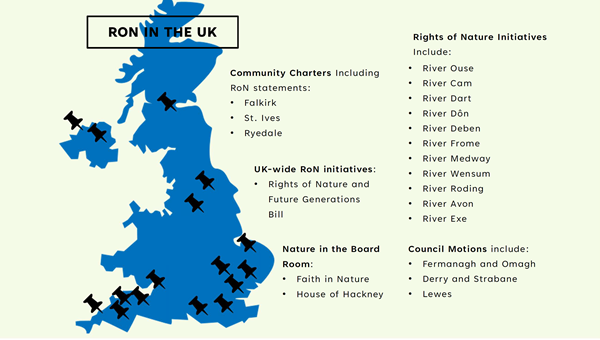Rights of Nature, Rights of Rivers: Definitions and Declarations in the Movement
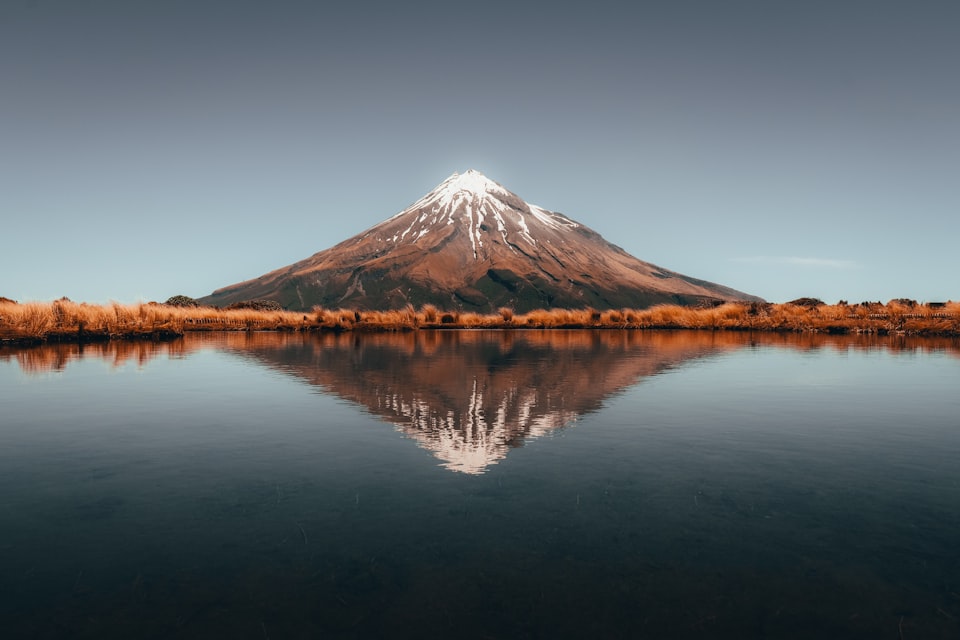
By Krishan Nursimooloo in association with XR Ireland and Claire Nevin
The concept of Rights of Nature challenges the way many human beings see the world, a mindset of the natural environment being seen, either actively or passively, as a commodity to be dominated and exploited for the sake of profit or consumption. This idea is deeply encoded in global institutions, including our anthropocentric legal systems. Rights of Nature proposes a shift in our way of thinking about the complex interrelations between humans and nature.
Rights of Nature is a legal instrument that enables nature, wholly or partly, i.e. ecosystems or species, to have inherent rights, and states that these entities should legally have the same protection as people and corporations; that ecosystems and species have legal rights to exist, thrive and regenerate. It enables the defence of the environment in court – not only for the benefit of people, but for the sake of nature itself - and ultimately, to give nature locus standi in court.

The modern legal concept originates in US environmental law, and while the idea of nature having rights has been around for centuries, indeed predates modern civilisation to our animistic ancestors, environmental advocates point to a 1972 United States Supreme Court decision, Sierra Club v. Morton, (perhaps better known as Mineral King v. Morton were the natural environment in question to have legal standing) as providing much of the impetus for current efforts; one which resonates with the world-view of many indigenous peoples all over the planet. To learn more about the US Rights of Nature movement, please check out our partner, Earth Law Center (ELC), who are at the heart of the campaign, and also the Community Environment Legal Defense Fund (CELDF) and the Global Alliance for the Rights of Nature (GARN).
What are Rights of Nature?
According to the concept, humans are part of the web of life, linked with other-than-human beings (plants, animals, rivers, mountains, oceans and all ecosystems) which have equal and intrinsic rights to exist, regenerate, evolve and thrive. Rights of Nature aim to provide guarantees for the protection of life on earth through our current legal and political system.

Such a change in our legal and political thinking would produce a shift from our current extractive economy towards a regenerative economy, and make political institutions accountable for any damage to the environment. This will benefit not only the natural environment but every aspect of our lives too.
A thriving environment means better and abundant food, clean air, clean water and better human health (see Recommendation 3 in the blog relating to a submission to Ireland's Citizens' Assembly on which Lawyers for Nature's community assisted, original submission document here). It is a human right as much as it is a right of nature.

Indeed, the Citizens' Assembly submission with which we assisted, touched on the idea of giving rights to the River Shannon, mentioned later in this article, and was inspired by indigenous guardianship of the Whanganui River, but tailored to the Irish context. As a consequence of this Citizens' Assembly, we call on the Irish Government to implement the Assembly's recommendations on Rights of Nature; giving rights to the Shannon would be one way of doing this. If you're interested to learn more about this, here's an article about the Assembly's recommendations, which they will shortly put to the Irish Parliament in a report
Ecocide as a parallel concept
As a starting point to reverse the destruction of the natural world, Rights of Nature would complement and extend our currently evolving legal system, similarly to Human Rights. It would give all beings on Earth fundamental rights to exist and evolve, and together with ecocide law, against severe harm to nature which is widespread or long-term it would consider human actions that breach these fundamental rights as illegitimate and unlawful. A definition of 'Ecocide' from Stop Ecocide is as follows:
Ecocide means unlawful or wanton acts committed with knowledge that there is a substantial likelihood of severe and either widespread or long-term damage to the environment being caused by those acts.

Currently, the Rome Statute of the International Criminal Court (ICC) lists four crimes: Genocide, Crimes Against Humanity, War Crimes, and Crimes of Aggression (recently added). The Statute can be amended to add a fifth crime: Ecocide: Protect earth's most precious ecosystems and allow them to recover.
Declaration on the Rights of Rivers
In recent years, there has been a move towards declarations of Rights of Nature associated with specific natural entities, i.e. rivers. One example is the River Shannon in Ireland, a declaration that could as easily be applied to every river in the world. The celtic original Sionainn, meaning 'wise river', is thought to have named after the Sionnan (Possessor of Wisdom), the granddaughter of Mana, and Mac Lir (Son of the Sea), a sea deity in Celtic mythology. It has also been said that Sionnan is the Goddess of The River Shannon.
The River Shannon is unique, but is far from intact due the loss of respect and widespread contamination, alteration and neglect by dominant human activities and governance. The river is deeply interconnected with surrounding ecosystems from its source right through its estuary where it merges with the Atlantic Ocean. It is a complex ecosystem, an intrinsic and essential part of the wider ecosystems, landscapes and legends of the island of Ireland.

The River Shannon ecosystem includes the streams, rivulets and lakes, the air, the mountains, valleys and floodplains the forests. wetlands and grasslands, the springs and waterfalls and its estuary together with the interdependent more-than-human-beings. They are an indivisible, self-regulating community of interrelated beings that sustain, contain and reproduce.
If we can affirm that water is life and that we must protect it, as our existence depends on it, then the River Shannon is a living being and as such has:
- The right to life.
- The right to exist, thrive and evolve.
- The right to be respected. To reaffirm an affective relationship with human beings. To be celebrated together with its culture and ancient mythology and to inspire rights for all rivers and the rights of nature.
- The right to flow free from human interference.
- The right to feed and be fed by sustainable aquifers, recognising that the River Shannon is not only an essential source of drinking water for many households, but also sustains life for more-than-human-beings on the island of Ireland.
- The right to perform essential functions within its ecosystem.
- The right to sustain and restore a thriving native biodiversity, recognising that the biodiversity of the island of Ireland has suffered huge and ongoing losses.
- The right to freedom and protection from pollution, damming, extraction and alterations which we acknowledge have ongoing and negative impacts, many of which are long term, some of which are irreversible, on the integrity of the River Shannon itself and the ecosystems it supports.
- Recognising that the relevant authorities and current laws are unable and ill-equipped to protect, preserve and restore the River Shannon and the ecosystems that depend on it.
- The right to be entitled to the independent appointment of one or more legal guardians acting solely on behalf of the river's rights and who may represent the river in any legal proceeding or before any governmental body. And that those guardians shall be empowered, enabled and protected as part of the wider community of water protectors and earth protectors.
- The right to be free from subordination or ownership, in its entirety from source to ocean, as is set out under current laws which violate the river's fundamental rights, thus we call on the negation of ownership of the River Shannon by the state, any other body or person.
- The right to protection from further damage to regeneration and ecological restoration which is important due the extent of damage and neglect to date.

We invite people to join us in celebrating the River Shannon and to become a valuable voice for the river in a conversation with nature, aspiring to reaffirm respect and equality for nature amongst humans. We recognise that private ownership and management of the River Shannon and its fisheries has been instrumental in the degradation of the river. The private property system has been responsible of disbanding ancient and indigenous laws which were designed to protect the river and waters of the island of Ireland.
Therefore, we call for a strong legal system to be created to ensure full implementation and enforcement of the rights in this declaration, to promptly protect the River Shannon from further degradation, to progress its ecological regeneration. Following from this, we call on the Irish Government to implement the Citizens' Assembly's recommendations on Rights of Nature and giving rights to the Shannon would be one way of doing this. To learn more about the submission that was made to the Citizens' Assembly, you can follow this link and read this article which references the report being submitted to the Irish Parliament.
Additionally, please consider signing the Universal Declaration on the Rights of Rivers, as part of the ongoing campaign to gives all rivers rights, globally.
The state of Rights of Nature globally
The great news is that Rights of Nature are being recognised around the world.
Rights of Nature have been introduced in the constitution or ensure harmonious relationships of mutual mutual co-existence between society and nature in the constitution of Ecuador. Drawing from Maori knowledge and governance systems, legal personality and rights have been given to the Whanganui River as mentioned above, the Te Urewera former National Park, and Mount Taranaki in New Zealand.

In Colombia, the Constitutional Court and Supreme Court have recognised the Atrato River and the Colombian Amazon River ecosystem as rights-bearing entities, deserving protection from harm. In India, the Ganges and Yamuna rivers as well as two glaciers and the entire animal kingdom have been declared as having rights equivalent to that of a person.
And an International Rights of Nature Tribunal exists which works as a forum through which people from around the world can:
"Speak on behalf of nature, protest the destruction of the earth, and make recommendations about Earth's protection and restoration."
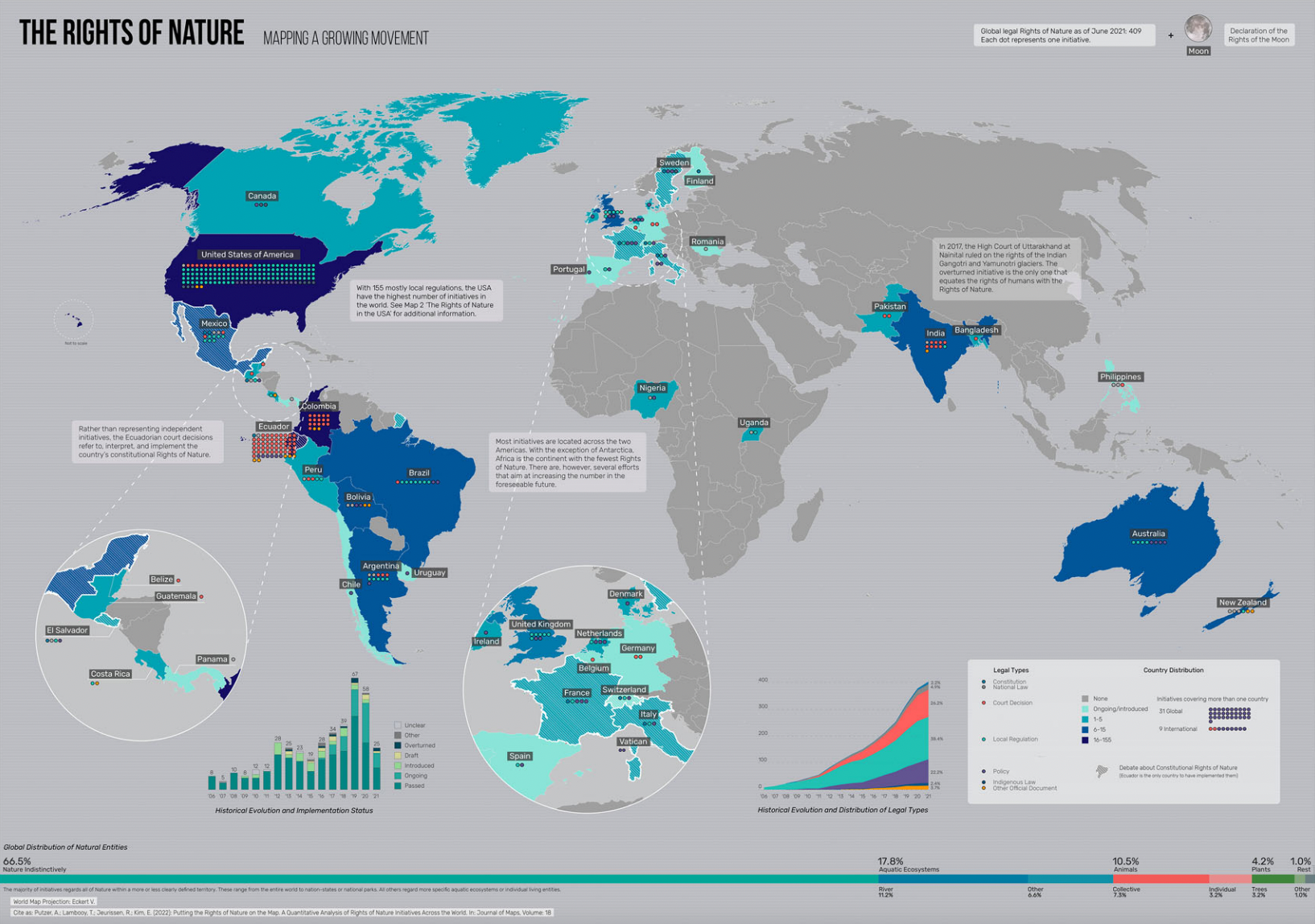
Subscribe to Lawyers for Nature & Join our Community
If you are on the website, enjoyed this blog and are yet to subscribe to the Lawyers for Nature newsletter, you can click the button at the bottom right hand corner of this page, or simply click here. You can also use our Contact Page if you would like to reach out directly, or simply join our Community Discord Server.
We look forward to working with you.
